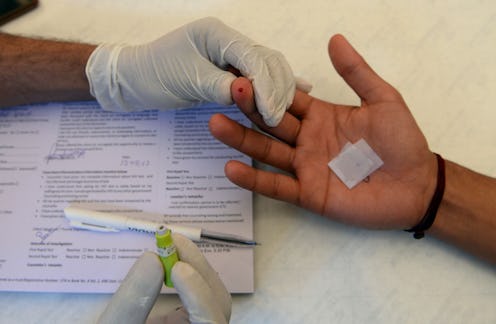News
GOP Lawmaker Says HIV Patients Should Be Quarantined

A Republican lawmaker in Georgia has suggested that people with HIV should be quarantined, adding that if they would "die more readily," they'd pose less of a risk to surrounding communities. State Rep. Betty Price — the wife of former Health and Human Services Director Tom Price — made the comments at a committee hearing on Tuesday and was swiftly denounced by HIV advocacy groups for doing so. Bustle has reached out to Price for clarification on her remarks.
"I don’t want to say the quarantine word, but I guess I just said it," Price said at the hearing, as reported by Protect Q Atlanta. "Is there an ability, since I would guess that public dollars are expended heavily in prophylaxis and treatment of this condition — so we have a public interest in curtailing the spread. What would you advise, or are there any methods legally that we could do that would curtail the spread?”
At another point during the hearing, Price seemed to imply that overall public health would be improved if people with HIV died sooner after contracting the disease.
“It’s almost frightening the number of people who are living that are…carriers with the potential to spread,” Price said. “Whereas in the past, they died more readily, and then at that point, they’re not posing a risk."
In all fairness to Price, she did speak more generally about the state's interest in "curtailing the spread" of HIV, and that's a perfectly laudable goal. That goes double for Georgia, which ranked second in the nation for new HIV diagnoses in 2013, with black residents at the highest risk of contracting it.
And yet Price didn't merely suggest that the state research methods of preventing the spread of HIV and stop there, even though she could have. She went on to use the 'quarantine' word," as she put it, and that's a problem. To quarantine someone is to forcibly remove them from their community and keep them in confinement, even if doing so is against their will, and that's, well, wrong.
However, Price is not the first Republican to propose quarantining people with HIV. In 1987, the staunchly homophobic Sen. Jesse Helms said that "somewhere along the line, we`re going to have to quarantine" HIV patients, and in 2013, the Republican governor of Kansas signed a bill abolishing the state's ban on HIV quarantines. A 1986 ballot proposal in California would have paved the way for quarantines of people with HIV, although voters resoundingly defeated that proposal.
Meanwhile, when Price said that HIV patients "died more readily" in the past, and thus posed less of a risk to their surrounding communities, she probably didn't mean to say that the state of Georgia should expedite the death of people with HIV. But by making that comment, she inadvertently devalued the lives of people with HIV by implying that, insofar as the broader public health is concerned, they're a "lost cause." That's not the case; the goal of any good-faith, HIV-related public health effort must be both to halt the spread of the disease and to make life more livable for those who contract it.
GLAAD called Price's remarks "totally unacceptable" and called on her to apologize.
“We have come a long way in how we understand and talk about HIV as a nation, and comments like those made by Georgia State Representative Betty Price fly in the face of that progress, and of basic decency," Sarah Kate Ellis, President and CEO of GLAAD, said in a statement. “This language coming from anyone is totally unacceptable, but coming from a medical doctor and a Georgia State Representative it is reprehensible. GLAAD is calling for a full apology for these remarks on behalf of all people affected by this harmful statement.”
The co-director for the Emory Center for AIDS Research was slightly more charitable to Price, telling STAT news that her comments were probably "not mean-spirited" but emphasizing nonetheless that quarantining isn't an effective method for stoping the spread of HIV.
"We need to get public health [workers] to find people, get them into care, keep them in care, and keep them virally suppressed," Dr Carlos del Rio told STAT. "If we can keep them virally suppressed, we can stop the epidemic.”